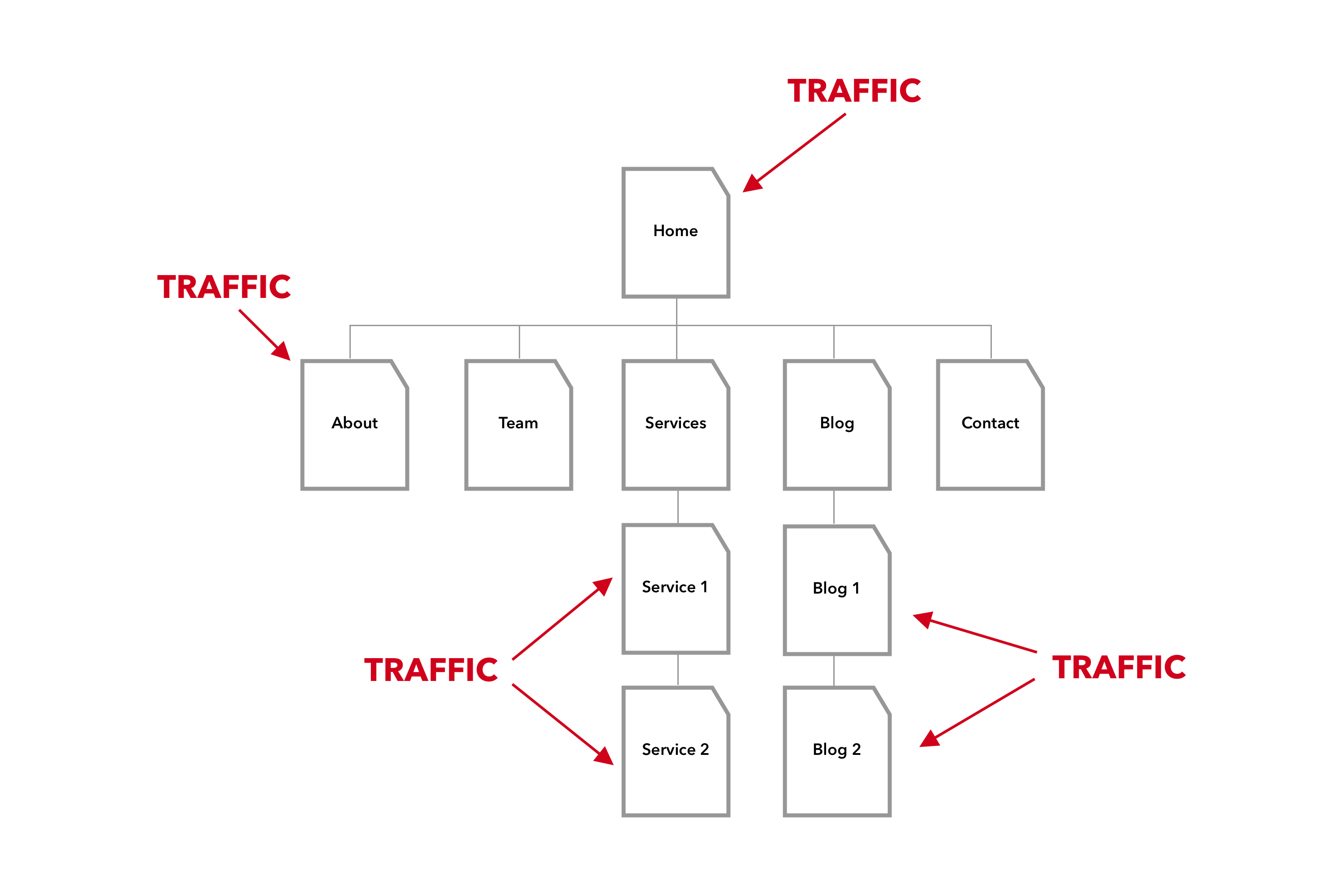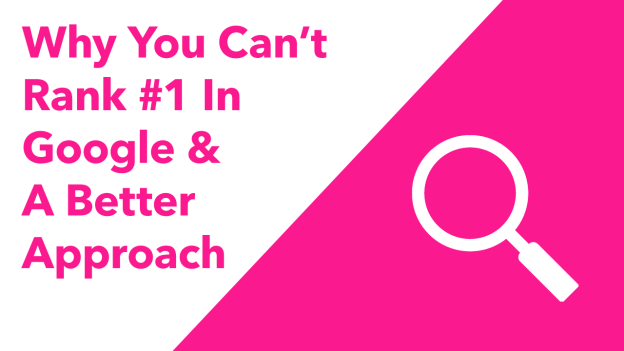I made this video because a client of mine wanted to know what it would take to rank #1 for a specific keyword in Google.
I haven’t gotten this ask in quite a while, but I figure people will ask this from time to time.
Let’s get into why this isn’t really possible and what the better approach is.
1. Google Search Result Page Rankings Constantly Change

It can be really hard to dominate a single keyword ranking for an extended period of time.
In competitive industries this can be like a never ending game of king of the hill.
Not only can Google deem that your competitor is a better fit for that prized keyword, Google’s algorithm changes regularly, so trying to dominate that #1 position can be like holding on to a bucking bronco.
Now, if your #1 keyword is your brand name, then that’s something you CAN hold on to for a long time. There’s no better fit for your own branded keyword than your website. There are strange cases where brands can get unseated, but it’s pretty rare (and they usually come right back).
2. Focusing On Ranking For A Specific Keyword Often Looks Like Web Spam To Google

When people get really greedy with search engine optimization, they’ll result to any techniques that they think will help them “game the system”.
These techniques include buying links, uploading articles to low quality websites with links pointing to their site, creating robo-content, etc.
What I’ve noticed is the harder people try to do whatever it takes to get that #1 keyword ranking they end up shooting themselves in the foot. And the most common reason why is that websites can get effectively kicked out of Google or penalized for engaging in webspam.
The way to get to the top of a Google search result page is to be the best possible result for that keyword. If you’re going to focus on anything, focus on that concept. What makes your site the best result for a given search engine query?
I do have to say this though: Google isn’t always the best at picking quality results. I suppose they are continually trying to improve this process. So, if you’ve tried really hard, and you’re not #1, it’s probably not your fault. That’s just the Googleverse for you.
3. It’s Really Hard

Now, there are instances where certain websites maintain a top keyword position for years (maybe bouncing between positions 1,2 and 3 from time-to-time).
And there’s usually a good reason for this.
Their website is the best site to serve as a result for that keyword. That usually means they put in the work.
Here are some of the factors that tend to push a website to the top of the pile:
- They have a strong brand – The bigger the brand or the stronger the brand, the more weight Google gives that business in the search results pages. And that’s because most people trust big brands (they’re not a fly-by-night operation), so Google trusts sending THEIR USERS to these websites.
- The website has been around a long time – This is another signal that indicates trustworthiness. If Google hasn’t had a problem with a site for decades and it’s been a good choice for their users for decades, then their website has a better chance at holding down a top position. This also means it’s probably built up a good number of quality backlinks over the years.
- Backlinks – The website has managed to amass a lot of quality backlinks over the year from all sorts of marketing efforts. Usually good PR helps with this.
- Intent – The website serves the intent of the keyword search. The more dead-on it matches, the better.
- Website Experience – The website is mobile friendly, fast, easy to navigate. Google does weigh some of these performance metrics in their ranking formula.
So… focus on
Does This Sound Impossible? – Don’t Worry! There’s A Better Approach
Just because you’re not Procter and Gamble, doesn’t mean you can’t reap the benefits of search engine optimization.
As a matter of fact, the sooner you ditch the idea of trying to rank for a specific keyword, the sooner you’ll enter the world of major opportunity.
I’ve been working on websites since 1999. And I’ve been fortunate to look at the website statistics and analytics from brand new websites with no traffic to MAJOR websites will millions of visitors a month.
When you get to peer over this data, you learn a lot about how the internet works and where website traffic comes from. It’s incredibly eye-opening.
1. Website Traffic Comes In Through Many Pages Of Your Site

Not all website traffic enters through the home page.
I’ve known this for 20 years. But I’m working on websites every day. I’m not sure if everyone understands this concept.
Basically, Google and other search engines (and other websites), send people to pages other than your home page.
That’s why it’s a good idea to snoop around your site once in a while and put yourself in the seat of your visitor. What’s your website experience like? How can it be improved?
You should also do this on your mobile phone since a large number of people will be viewing your site on their phone.
2. New Pages Bring In New Traffic Opportunities
The first thing I do with any new client is a keyword analysis.
I want to know every possible keyword, phrase, question, brand name variation, team member – basically any word or set of words that’s related to the business – and I want to know how many times a month people are searching for these words.
When I know this, I can find opportunities for new pages and blog posts that my clients can have created that will bring in new streams of website traffic.
If you think about this for a second, this is incredibly valuable. Opening up new streams of website traffic can create new customer opportunities. In many cases, a few new customers a year for certain businesses can really boost business.
Plus, once these new pages and posts have been published – they keep working. I step away and the work I have done keeps working for my clients long after I have left.
Important Lesson: People enter your new and old pages by conducting search engine queries that aren’t always based on single keyword or highly competitive keywords. Sometimes people conduct searches by typing in a sentence or long phrases. Sometimes it’s an obscure search. Either way, new page content attracts these types of searches (many of them!) and the cumulative effect can be the same as ranking #1 for a highly competitive keyword.
3. New Pages Serve As Social Media Marketing Material
This is why SEO & content marketing is really the best ROI in my opinion. It’s the seed for so much more.
Every time you publish new website content, you’re not just creating new search engine traffic opportunities, you’re also creating content for your social media marketing efforts.
Some people really get down with this approach. They’ll take out pieces of posts and pages and use it for social media snippet content for months!
And with social media, you’re totally allowed to repost important content multiple times over the course of any given week, month or year. There’s a ton of value to pull from just one written website page or post.
4. New Pages Serve As Newsletter Content
“Oh gosh, I know I need to do a newsletter!”
Well that anxiety is over now that you have written website content. You can usually just copy and paste your blog or page content into your email marketing tool of choice and KABLAMO! You’re done.
Some people even have it wired to automatically shoot out an email every time they hit publish on their website.
Don’t sleep on email. A good email newsletter is worth it’s weight in gold. It’s one of those rare internet marketing areas, where you control it and no one can really take it away from you. You can get kicked out of Google, lose your social media accounts, but your email list is really yours. Build it!
Interested In Going Down This Road?
If you’d like to have me work on this for you, that’s what I do. Let’s chat and see if your business would be a good fit:


Insightful post! It’s important to understand that ranking #1 on Google involves more than just targeting a keyword. Factors like user intent, content quality, and competition play significant roles. Your explanation on focusing on providing value and building authority instead of obsessing over rankings is very practical. Thanks for sharing!